Gout Gout's sprinting fireworks are creating headlines but his performances are just part of a wider emergence of talent Down Under
Gout Gout has really done it now. Whenever a young athlete bursts on to the scene with a glimpse of their potential, allied to the excitement is an instinctive urge not to put too much pressure on shoulders perhaps not yet equipped to carry the burden of expectation. History has taught us, with the numerous examples of phenoms who have burnt out well before they really had the chance to catch fire, not to get too carried away too soon.
All the signs, however, indicate that this 17-year-old is different. Very different. Not only is he setting the world alight with his extraordinary running and captivating style, but crucially he is also capturing the public’s imagination.
Crowds flocked to last month’s Australian Championships in Perth, while the Maurie Plant Meet at the end of March was a 10,000 sell-out and enjoyed live free-to-air TV coverage. One of the main reasons for the hike in interest was the presence of Gout, who hardly dampened the growing hype that now surrounds his every move.
First, in Melbourne, he narrowly lost a brilliant 200m to world indoor 60m medallist Lachlan Kennedy but was still feted like a hero. A noticeably youthful audience then watched in awe a couple of weeks later as he broke 10 seconds for 100m – running 9.99 twice on the way to the U20 national title – and then clocked an astonishing 19.84 in taking the senior 200m gold.
The only fly in the ointment was the fact that all were achieved with an illegal tailwind but, still, he is now the second-fastest U20 200m sprinter in history in all conditions. His 20.21 on the way to the final was also a championship record.
It’s little surprise that the spotlight is falling on this compelling character who, in December, ran the quickest 200m time ever by a 16-year-old when hitting the line in 20.04, better than Usain Bolt’s personal best at the same age. Yet, on closer inspection, he is the tip of an increasingly impressive iceberg. Quietly, but in plain sight, Australian athletics has been building its strength and depth.

“If I was the rest of the world, I'd be a little bit nervous about Australia, because I feel like we could be pushing to being one of the powerhouse nations of track and field,” says Tamsyn Manou, a three-time Olympian and former world indoor 800m champion turned commentator.
There is good reason for her making such a claim. In Paris last year, the Australian team had their greatest Olympic track and field performance since Melbourne 1956, with seven medals (one gold, two silver, four bronze), while perhaps more pertinently the World U20 Championships in Lima produced a record medal haul of 14 (two of them gold). The dream scenario of having a number of established, experienced senior athletes in contention for medals while the next generation of talent starts to grow and develop is unfolding as we speak.
Aside from Gout and Kennedy, there are other sprint stars in the making in the form of Torrie Lewis, Leah O’Brien and Jessica Milat, while Cameron Myers and Claudia Hollingsworth have stood out in the middle distances and Delta Amidzovski is world U20 long jump champion and 100m hurdles bronze medallist.
A glance at the senior side of things reveals Olympic and world pole vault champion Nina Kennedy, Olympic 1500m silver medallist Jessica Hull, two-time world indoor high jump champion and two-time Olympic silver medallist Nicola Olyslagers, Olympic bronze medallist and former world high jump champion Eleanor Patterson, double Olympic race walking bronze medallist Jemima Montag and Matthew Denny, who last month achieved the second-furthest discus throw of all time – 74.78m. That’s before you even mention seasoned distance campaigners such as Commonwealth 1500m champion Olli Hoare and the new 800m national record-holder Peter Bol.
Why such an upturn in fortunes, then? As Manou points out, there has been a pronounced move from the powers that be towards taking larger teams to major championships, as well as a greater importance being placed on the value of good coaching.
Perhaps the key factor, though, is the incentive of a home Olympics – in this case Brisbane 2032 – to aim for. Manou competed at the Sydney Games of 2000, in which Cathy Freeman so memorably shone in the spotlight, and she can see echoes of the past in what is happening in her homeland right now.
“As soon as [Juan Antonio] Samaranch said that Sydney was going to host the Olympics you felt this wave of the youth going: ‘I could make that’ and it really lifted that next generation, as well as the generation that was already there,” says the 46-year-old. “You're seeing exactly the same effect [now].
“In sport, when you have depth in an event, it means that everybody else has to lift. You just have to go back to the 2000 Olympics, where Cathy Freeman was so incredible. We had seven Australian women qualify for that 400m going into Sydney – seven women under 52 seconds – and that was because Cathy was so good.
“As an athlete who was part of the sideshow, I'll forever be grateful for the fact that we ran in an era with Cathy, because we were lucky enough to have the effects of that as well and I think that's what Australian athletics is going to see now. It’s just [a question of] who's going to be that next Cathy Freeman that carries the wave and captures the public imagination…but I think we're already seeing who it's going to be!”
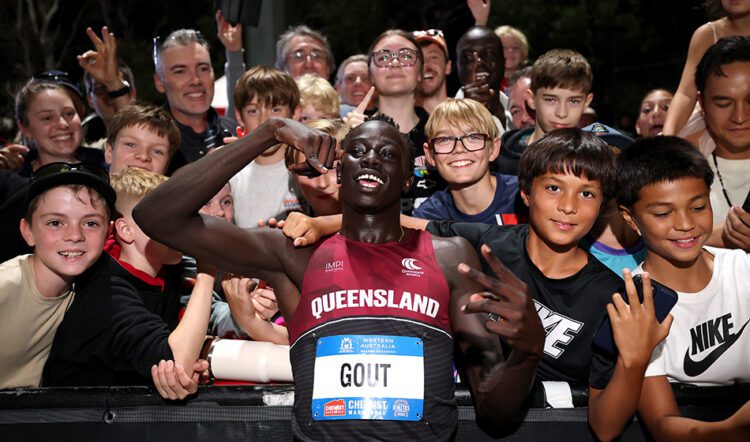
Gout Gout will still just be 24 when the Olympic circus rolls back into Australia and he is undoubtedly the hook that is drawing the public interest back towards his sport. Manou is also the Director of Sport at a private all-girls school in Melbourne and now finds herself fielding more and more questions about the new wave of Australian talent. Not so long ago, she lived in Gout’s native Queensland and recalls seeing the earlier stages of his career.
“I used to go and watch some of the state titles and I saw him and some others coming through the school ranks,” she says. “These talented athletes, you see them running and you just know that they've just got something.
“He was this really raw talent when he first came out onto the track but clearly had very good leg turnover, leg speed, and that wonderful ability to throw his legs out and just relax, but also stay relaxed under pressure.”
He has also been guided by the experienced coaching hand of Di Sheppard, whose work is very much evident in his recent performances.
“He's always been this raw talent,” adds Manou. “You see these legs and arms going everywhere and Di has been able to clean that up a little bit. The result is that we're seeing these super fast times. He's now using his arms beautifully and his knee lift and his drive is fantastic. He's an exquisite natural talent. The pop he gets off the ground is just insane. It'd be really nice to have somebody that people speak about around the world, like Usain Bolt. He captured the imagination of everybody, and I think to have somebody like that that's Australian… we love our sports stars, so it's really exciting.”
Manou also fully appreciates the need not to look too far ahead but argues that Gout is already experiencing what will be an invaluable part of his sporting education, learning on the job.
“If you watch him run, it's hard not to get excited,” she adds. “There are things he needs to work on. It's clear that he's not the best starter in the field – he needs to work on that – but the back end of his races is just incredible.
“I think it's okay to get excited, but I think it's also great to make sure that we still do go: ‘Okay, he's only 17 years of age’.
“When he ran at the Maurie Plant Meet, for example, and Lachie Kennedy beat him, I think that was good, because it showed everybody that he's going to lose some races and he's going to have races that aren't as consistent, because he is 17, and I think that's really healthy to see.
“I was fortunate enough to be there and the public still loved him. Everybody was still wanting autographs from both of those athletes, and loved getting around him, so as long as he can hold on to that attitude of: ‘Some races aren't going to go the way that I want them to go, but it's not the end of the world’, then I think they're valuable lessons moving forward – just as valuable as running super fast times.”
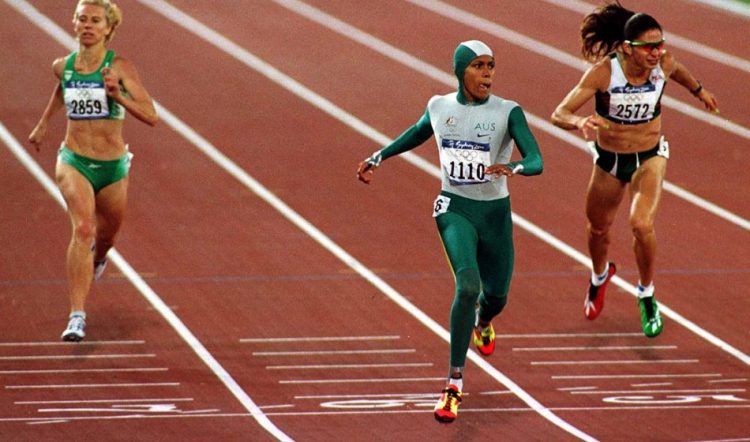
With Brisbane in mind, Manou admits that the Australian athletes are already ahead of the expected development curve – though that in itself is likely to work in their favour.
“It definitely does feel that athletics has really gone ‘bang!’ already, whereas for Sydney [2000], I thought that it probably started to step up in 1996 and then there was a big lead-in for those four years,” she says. “But we've still got the LA Olympics, and a lot of other events in between before we get to Brisbane.”
She adds: “If you use the example of Cathy Freeman, she went to [the 1992 Olympics in] Barcelona and ran that semi-final where she went out super fast and then blew up, but then she went to Atlanta and because of that experience she was incredible there [winning silver]. She and Marie-Jose Perec ran 48 seconds and just blew us all away with how good that was.
“Because she dealt with that, she had that capability and that experience under her belt to then deal with what would have been the most incredible pressure of having a whole country pretty much on her shoulders, as she was running that 400m. That's hopefully what Gout Gout will learn from and so many other people will be able to help him along the journey but, at the end of the day, as an athlete you're the one who has to go out there and perform, and being able to have those experiences and have an Olympics before that as a stepping stone in LA will be really good for him.”
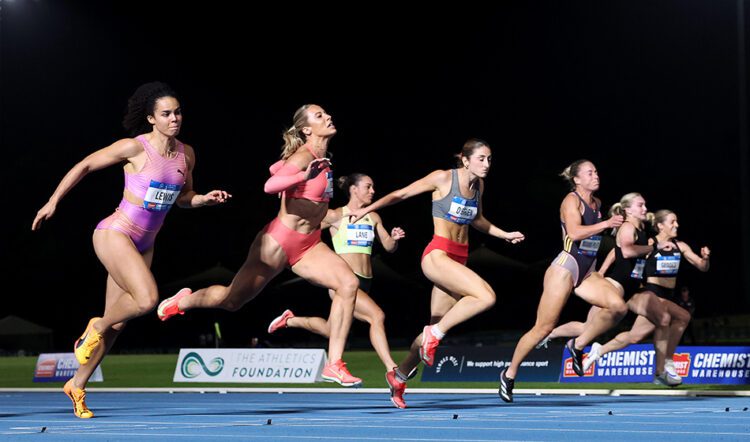
He won’t be alone, though.
“In [just about] every event we're watching, we're just going: ‘Bam! There's another star in the making’,” says Manou. “[But] the other thing is that we have such wonderful role models and leaders within the Australian athletics chain. We've got so many great athletes that have won medals in Olympic Games and World Championships, that are able to then be in and around teams, and they also help carry the weight of expectations.
“I think that will help a lot of our young athletes coming through and help in terms of how good our team is as a whole. There's not just one athlete going in – there are a lot of athletes that we're all looking at and I think that's a really big bonus.”

Australia's got talent - a cross section of the nation's growing track and field strength
The Rising Stars
Gout Gout
Age: 17
Events: 100m and 200m
The Queenslander is rapidly becoming one of the most talked about athletes in the world, having broken Peter Norman’s long-standing Australian 200m record, won world U20 silver last year and picked up his first senior national 200m title last month.
Lachlan Kennedy
Age: 21
Events: 100m and 200m
The former rugby player who competed in Australia’s Olympic 4x100m relay team last summer was only just pipped to the world indoor 60m title by Britain’s Jeremiah Azu, clocking an Australian indoor record of 6.50 on his way to silver.
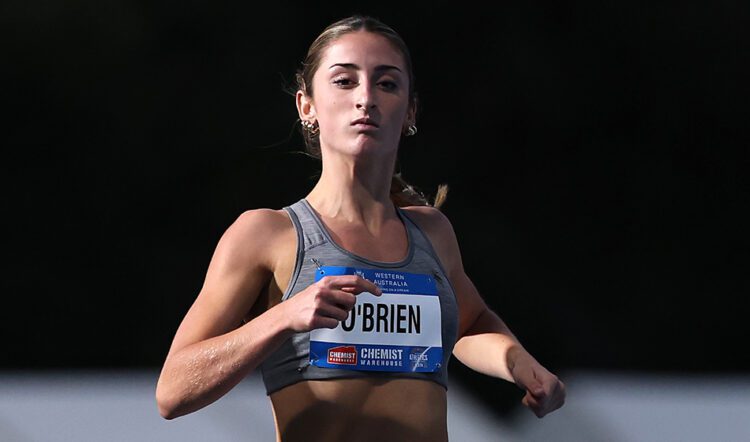
Leah O’Brien
Age: 17
Events: 100m and 200m
The West Australian teenager won the national U18s girls 100m in 11.14, breaking Raelene Boyle’s Australian junior record that was set at the 1968 Olympics by six hundredths of a second. She then took silver in the senior women’s race behind Torrie Lewis.
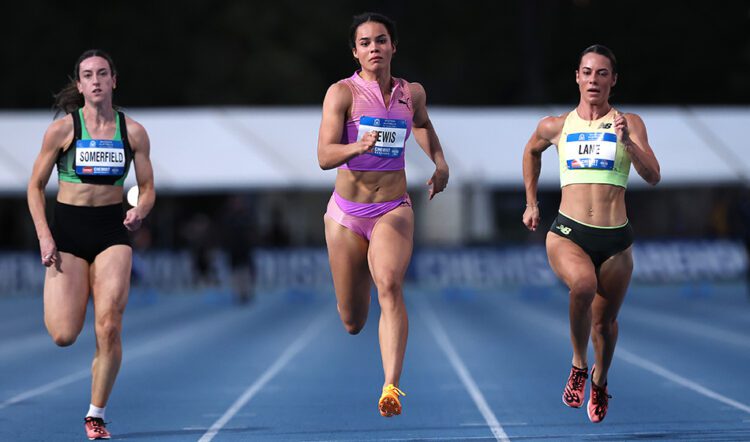
Torrie Lewis
Age: 20
Events: 100m and 200m
A world U20 200m medallist last year, the Oceania champion has started 2025 in fine form, winning the Australian 100m title.
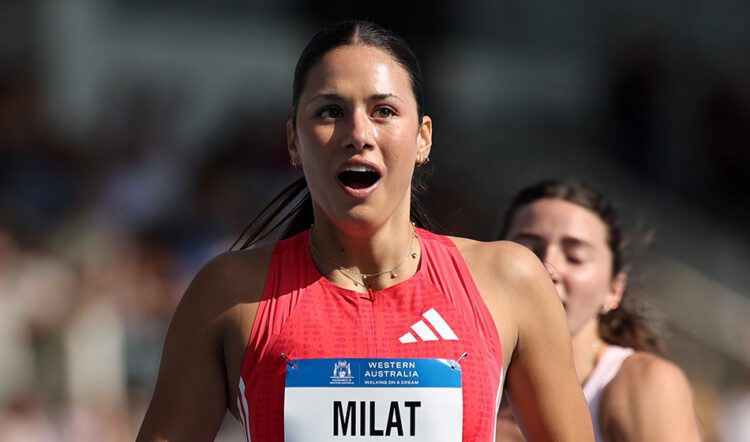
Jessica Milat
Age: 20
Events: 100m and 200m
Just missed out on a world
U20 medal in Lima, then sprung
a surprise by winning the Australian 200m title with a personal best
of 22.75.
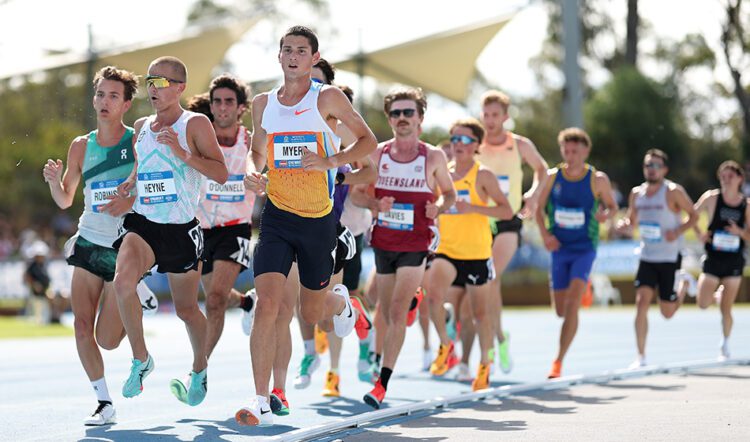
Cameron Myers
Age: 18
Events: 1500m/mile/3000m
Expectations have been high on this teenager since he became the fastest 16-year-old to run a mile back in 2023. Missed out on Olympic qualification last year but in 2025 he has broken the world under-20 mile record twice, equalled the national mile record and improved his 3000m PB by eight seconds and won his first senior national 1500m title.
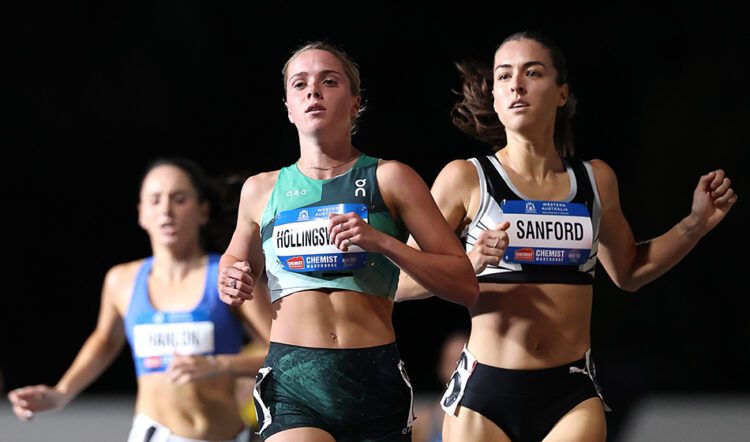
Claudia Hollingsworth
Age: 20
Events: 800m/1500m
The world U20 800m silver medallist also made her Olympic debut in Paris last summer, reaching the 800m semi-finals. She broke the national U20 record and won the Australian 800m title last year, finishing second in the 2025 champions behind fellow Olympian Abbey Caldwell.
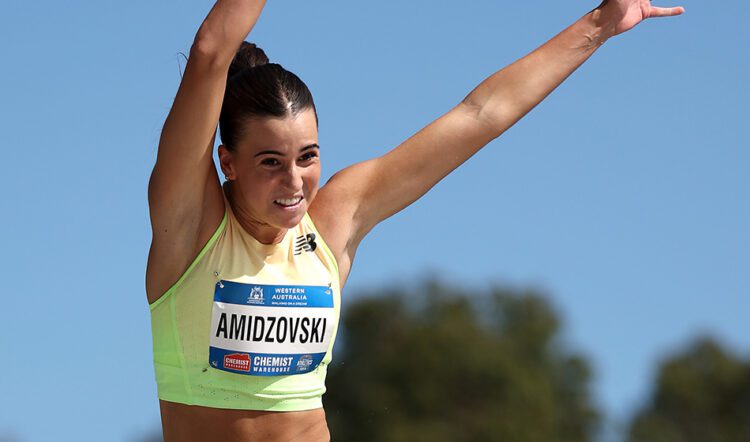
Delta Amidzovski
Age: 18
Events: Long jump/100m hurdles
The world U20 long jump champion also left Lima with a 100m hurdles bronze and excels in both events. She was third over the hurdles at this year’s national championships, also coming second in the long jump.
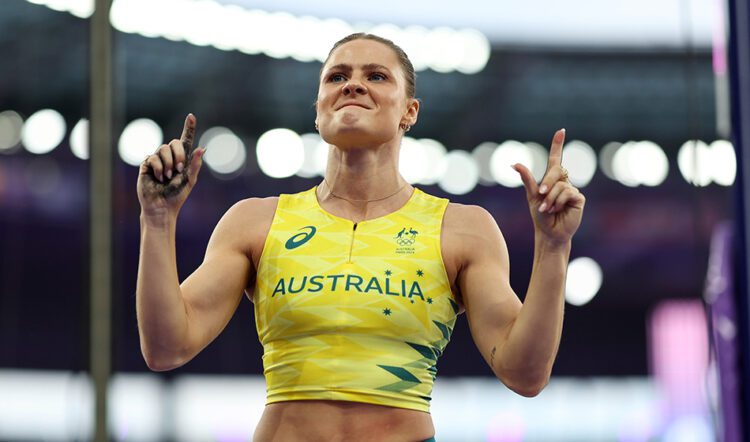
The established pros
Nina Kennedy
Age: 28
Event: Pole vault
This highly decorated national record-holder is the reigning Olympic pole vault champion as well as a World Championships gold medallist – sharing the title with Katie Moon in Budapest – and Commonwealth champion.
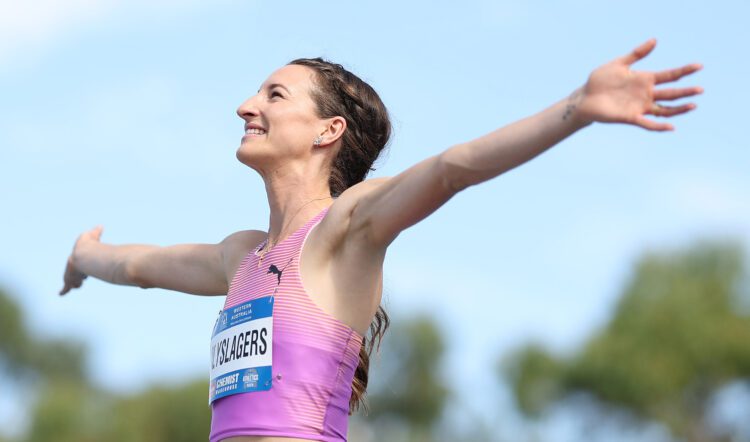
Nicola Olyslagers
Age: 28
Event: High jump
The serial note taker has used that method to propel her to two consecutive world indoor titles, as well Olympic silver medals. She also has world outdoor and Commonwealth bronze medals to her name.

Jessica Hull
Age: 28
Events: 1500m/3000m/5000m
The two-time Olympian has grown in stature in recent years, taking 1500m silver in Paris and breaking the 2000m world record last summer. Won 3000m bronze at this year’s World Indoor Championships and the 1500m/5000m double at the national championships.
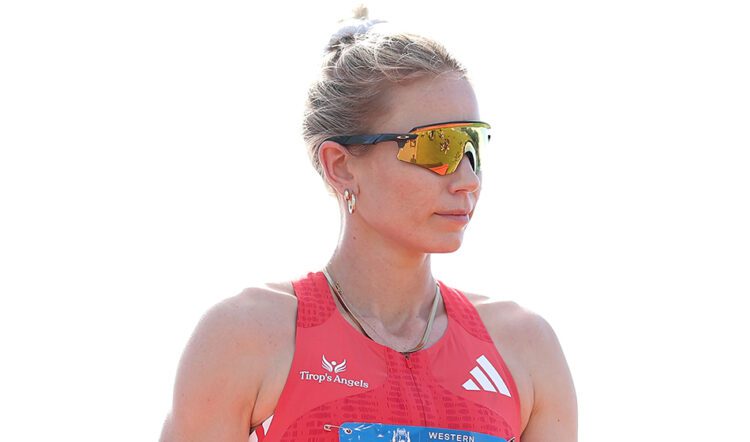
Eleanor Patterson
Age: 28
Event: High jump
Another top class Australian field eventer, her first major international title came at the 2014 Commonwealth Games. Crowned world champion in 2022, and followed that up with silver in Budapest one year later. She has also won world indoor silver twice and came home from the Paris Olympics with bronze.
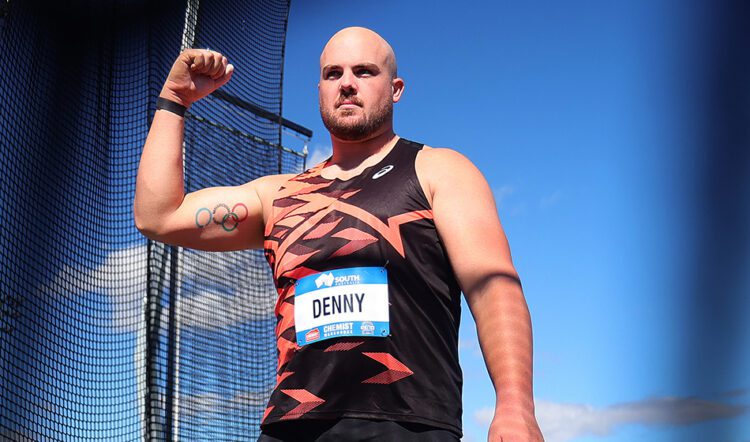
Matthew Denny
Age: 28
Event: Discus
The reigning Commonwealth champion and Olympic bronze medallist has started 2025 in the form of his life, producing 74.78m in Oklahoma last month to move to second on the all-time list behind Mykolas Alekna.
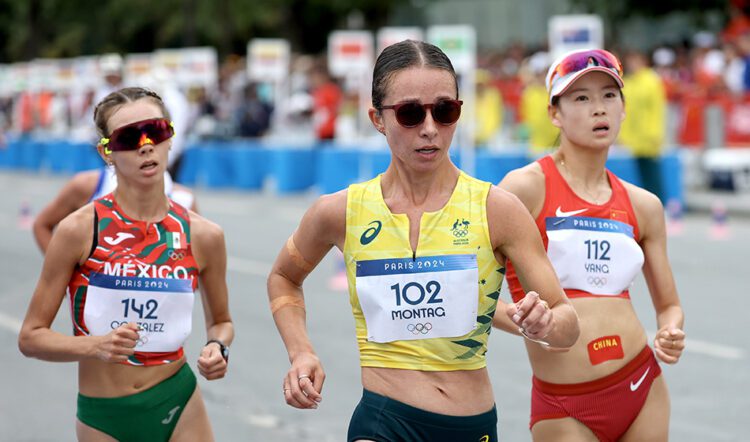
Jemima Montag
Age: 27
Event: 20km race walk
The former ballet dancer became the first Australian woman in 52 years to win two medals in track and field at the same Olympics, landing bronze in the 20km race walk and mixed marathon walk relay in Paris. She is also a two-time Commonwealth gold medallist and won world silver in Budapest.
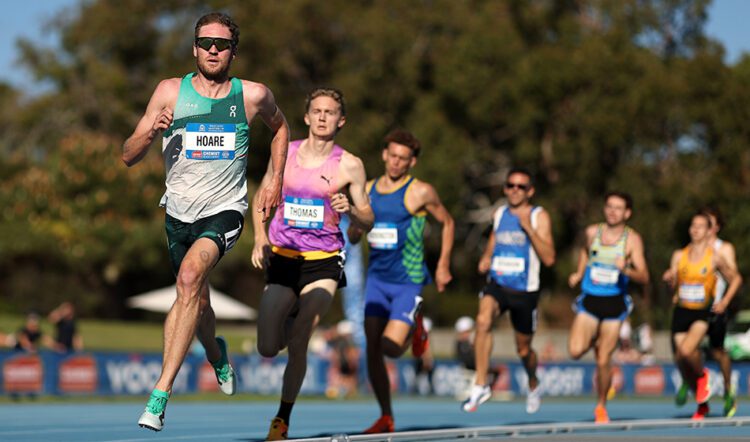
Olli Hoare
Age: 28
Events: 1500m/Mile/5000m
The Commonwealth 1500m champion is a two-time Olympian and also the Australian and Oceania record-holder for the distance, as well as the mile.
